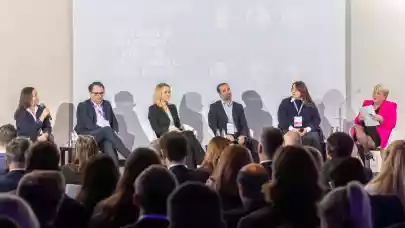
As elsewhere, the investment market in Poland is struggling with high interest rates and financing costs. Some asset classes though, such as flats for rent and warehouses, remain a desirable commodity among investors - this is how the panel discussion focusing on investment and financing trends at Future of Real Estate 2023 can be summarised. The event was organised by Property Forum and RICS in Warsaw this week.
Participants on the panel, chaired by Susanne Eickermann-Riepe, Chair of the RICS European World Regional Board, were to seek answers to the question of what assets will be most in demand by investors in the near future.
According to Anna Duchnowska, Managing Director – Investment Management, Europe at Invesco Real Estate, residential and warehouse properties will maintain their attractiveness. „Beds, sheds and meds are the key themes at the moment. In the medical sector, there are not many transactions because there are not many established products in the European market and pretty much everybody's chasing that. So we stay focused on our themes, which are centred around demographics, meaning beds and sheds in the selected parts of Europe. The smart money is sitting on the fence and waiting. And it is very selective, especially in the area of recapitalisation, and refinancing opportunities. Because what we see these days, is that the debt strategies can offer very similar returns to the equity investments”, said Duchnowska.
Dr. Piotr Goździewicz, Head of Transactions CEE at Cromwell Property Group drew attention to the increasing role of ESG factors, which are becoming more and more decisive year after year in determining the investment attractiveness of properties - both those still under development and those already in existence. “ESG is an integral part of investing right now, and of creating future value. No asset manager can ignore it, because in some years from now, the assets whose owners had ignored the ESG issues will become obsolete. But we need to keep in mind that at the end of the day, there must be value creation, and not value destruction. So sustainable investment is not just about focusing on ESG. It's about focusing on all the elements, buying at the right price, and creating value for the holders”, said Goździewicz.
For the biggest market players in Poland, it is clear that ESG - apart from the environmental aspect - is precisely a good way to build a competitive advantage. „We are in the business of developing and obviously, at its core, it's not very sustainable. However, we try and focus very much on our decarbonization strategy and we are constantly looking for alternative materials to minimize the embodied carbon. We are now working on a new investment in Wrocław, where we achieved a 70% decrease in the operational carbon, We have also started a new investment, where we want to achieve 100% neutrality in terms of operational carbon”, claimed Magdalena Uler-Kłeczek, Senior Capital Markets Director at 7R.
Which asset class is currently the least popular? „On average, offices are probably the least liked class. In the US, the „office apocalypse” is a fact, in the UK we have other severely affected areas, like the Canary Wharf and other locations, that have increased supply magnificently over the last decade”, said Dennis Selinas, CEO of Globalworth. „Obviously there is a lot of rewriting there and a lot of repositioning will be necessary because probably only 10% of offices there produce returns for the investors. From that perspective, I think that the situation looks better in CEE and SEE, whereby the office stock hasn't been built up over the last several decades. There is simply no excess supply there”, added Salinas.
In the public discourse, there are many claims that the only salvation for office buildings is to change their use to residential. However, Anna Duchnowska argues that this type of development must be very well thought out and planned. „There is a lot of noise around converting office buildings into residential ones, but I haven't seen yet - at least in Europe – any examples of successful conversions, which would make money for the end investors. The evaluations are not yet there to allow people to effectively convert. There has to be support or boost from the public side. We all know that there is a massive demographic demand for more residential units in the market,” she said.
High interest rates - currently the biggest brake on real estate investment - do not seem to have an equally negative impact on the health of banks and their willingness to finance new projects. „You need to have the right approach and to identify the right opportunities before the competition. This is our stance now and I have to say that it is the same as 8 or 9 years ago. We have always been looking into the fundamentals of the properties to finance so there is no major change from this perspective, only the circumstances changed. Personally, I am a strong believer in the strength of Poland and the perspectives of the local market, firstly, due to its size, but also due to the dynamics we still have in our society. So yes, I definitely would confirm that it still makes sense to lend money to real estate”, predicts Justyna Kedzierska-Klukowska, Head of the Warsaw Office of Berlin Hyp AG.



